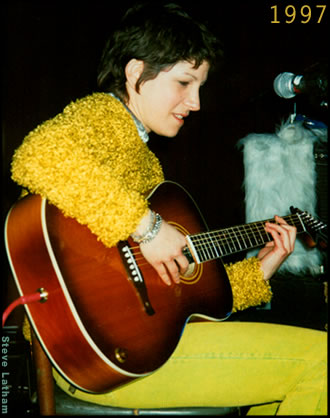
A Conversation with Jen Trynin (continued)
PM: The details and the dialogue put the reader right there with you. Was it written entirely from memory or were you keeping journals during those years?
JT: Mostly it was memory. Obviously, when you write a book like this, there's the question of, "Did the character of Big Wig say every single thing that I said he said?" I don't know. But it was a very vivid and memorable kind of experience, so once it happened, it was burned into my head. I remember being at Columbia Records, in the president's office, and what he looked like, and where I was sitting, and him telling me about Toad The Wet Sprocket, and him saying, "Hit, hit, hit!" Back then, I had an answering machine, and people would call in to leave messages, and I kept all of them. So I went back to listen to them, and I could remember the speech patterns of a lot of the people who ended up in the book because of the phone messages.
PM: While I was reading, I Googled a few names of characters and didn't find them. I assume all the names were changed.
JT: All the names were changed except for people in the common domain, basically. Courtney Love or David Geffen, for example. People who were famous and who anyone would know. I left those names the same, and I changed the other ones because it doesn't really matter who they were. Their position mattered, but not their names.
PM: Have any of these music business people come out of the woodwork to complain about how they're portrayed in the book?
JT: No one has complained yet. I sent the book to just about every main character. Some of the people I lost track of, sadly. The Burns guy who was the tour manager, I really liked him, and I tried to find him but couldn't. The sound guy wasn't in the book that much. I know what state he lives in, but I couldn't find him. But of the other people I could find, I sent it to them, and everyone seemed pretty cool about it. Almost all of them came to my readings in New York and L.A. That was kind of wonderful for me. Everyone has been such a good sport, and they realized why I wrote the book. Now we're all seeing each other again, and these are people who haven't seen me or each other in many years. We'd all left each other's company with such a bad taste in our mouths, it was kind of a way to reestablish a nicer feeling among everybody. That really meant a lot to me.

PM: It probably made these people nostalgic for a time when they were a little bit more in control and weren't fearful for their jobs.
JT: I think you're right. The character of Head Honcho, who was the general manager of Warner Brothers Records at the time, was let go right around the time I was. He's no longer in the music business. The character of Lola, who was my A & R person, and is a very well-known A & R person in the community, also left the music business, a few years after I did. A lot of the people are no longer in the music business. Some of them are much higher up in the music business. My first manager, who quit in the middle of my record, ended up, as of two years ago, being the president of Columbia. But he has since been let go and he is now drifting around. It's just a crazy business. [laughs]
PM: You capture the conversations with clueless disc jockeys really well. When you first started to meet these people were you surprised that they lived up to the cliche?
JT: Yes--that's a great question. [laughs] It was tough to be writing about these characters who do seem like a cliche. But the point is, cliches are cliches for a reason. Some of the DJs and some of the high-up execs really do act like that. You're sitting there in reality, thinking, "Oh my god, people really act like this!" [laughs] Only one person has complained about it so far, saying that some of the characters seem like cliches. It's hard to say, "Well, that's really the point about some of these people. They are like that." It's hard to write about stuff like that when it comes out like a cliche. I was hoping I put it in the right context so that the reader would understand that you as the reader see it as a cliche and so am I. [laughs]
PM: I was squirming right along with you when you'd meet a DJ who had no idea who you were and obviously hadn't listened to your record.
JT: That happened much more often than I ever care to admit. It's embarrassing. It's already happened with my book, too. Somebody had me on his radio show, and said to me, during a commercial break, "I don't know who you are. I don't know what you're doing here." I was like, "That's cool. Great." [laughs] continue
print (pdf) listen to clips puremusic home